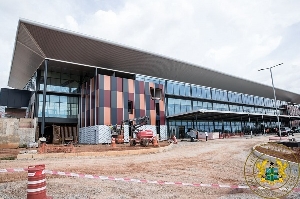Opinions of Saturday, 9 June 2007
Columnist: GNA
Metrology, the science of measurement ...
Accra, June 6, GNA - There is the need for immediate action to rectify the negative impact of the lifestyles of people on the environment.
The current human activities negatively affect the water; air; noise, soil, climate and radiation.
Water is so vital and essential that without it mankind would not survive, but it is polluted with all sorts of debris at the household level and chemicals at both agricultural and industrial levels. The air is always polluted with emission from vehicles and industrial machines leading to the contraction of diseases like cancer and other airborne diseases. The reduction in the ozone cover has made it possible for harmful solar radiation to cause various skin diseases. The soil, which is the fundamental means of food production and serves as part of life on earth, is also not spared. Instead of it improving the quality and quantity of food and assuring human kind of diverse flora and fauna, negative human activities have contaminated the soil with all kinds of chemicals, be it fertilizer; pesticides and industrial waste, thus losing its nutritional levels for optimal crop growth.
The noise levels in some parts of the country are unbearable thus impacting negatively the health of the people. To be able to control the hazardous effects of some of these negative human activities on the environment, measurements of certain parameters in the environment should be done to facilitate the monitoring of environmental changes and to determine their future effects on living organisms, hence the use of metrology, which is the science of measurement.
Metrology and measurements are essential to all aspects of human endeavour as they are used in activities ranging from production control; the measurement of environmental quality; assessment of health and safety; testing of quality of materials food and other products to ensure consumer protection.
This aspect of measurement is very crucial in international trade to provide the necessary technical means to ensure correct measurement through the implementation of a harmonized system of measurement. For this reason, the General Conference on Weights and Measures, which was held in France in 1875 took a decision that May 20 of every year be marked as World Metrology Day to create and deepen the consciousness of metrology world-wide.
This year's World Metrology Day was under the theme "Metrology and Environment" In Ghana, the day was celebrated by Ghana Standard Board (GSB) in collaboration with Environmental Protection Agency (EPA). These two organizations have teamed up to sensitize the public through radio and television programmes on the need to measure the environment to enhance accuracy of long-term measurement by their traceability to internationally recognized measurement standards. Mr Adu Darkwa, Executive Director of GSB, said this would allow people to trust in data provided by measurements and to have confidence in decisions taken on its basis.
This would also help to ensure that health and safety organizations, commercial enterprises and governments had the data needed to help to safeguard the health of the people as well as the planet.
Interestingly, the price of traded goods is derived from the quantity involved and is usually determined by measurements. Correct prices therefore depend on correct measurements. It is necessary then to verify measuring instruments but in both cases, the performance of a measuring instrument is compared with that of a measuring instrument of higher accuracy known as a Measurement Standard.
In addition to quantity, the quality of goods and their conformity to standards are essential concepts in international trade. As certificates of conformity are used to document conformity and such certificates are gaining in importance, the same way checking quality and conformity requires measurements in almost all cases. As Ghana joins the rest of the world to mark World Metrology Day, there is the need to ensure measurements of water to monitor its temperature, levels of nitrates and phosphates in agricultural and industrial effluents. The soil should also be measured to monitor its texture, moisture, nutritional levels for optimal crop growth, as well as monitor the pollutants from pesticides and industrial waste. Climate change should be measured to track long-term changes in weather, ocean temperatures and provide accurate data which governments can use to set and monitor the short-term and long-term effects of environmental policies.
Sound and radiation should also be monitored to prevent the noise pollution level that might damage one's hearing, record sound waves for possible earthquakes and tsunami activities, monitor radioactivity levels to survey man-made contamination and ensure the safety and effectiveness of medical devices. 6 June 07












